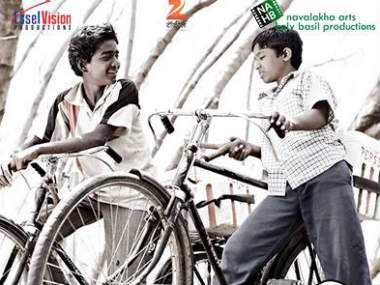Young Jabya, the hero of Fandry, is looking for a black sparrow with a tail like a kite for most of Nagraj Popatrao Manjule’s film. He’s been told that if he’s able to kill and then burn the black sparrow, its ashes will give Jabya his heart’s desire — the love and acceptance of Shalu, the girl he adores from a distance. The reason Jabya only follows Shalu with his eyes and doesn’t dare even speak to her in class isn’t only his adolescent shyness. Jabya is a poor, Dalit boy and Shalu is from a rich, upper caste family. The only way she can fall in love with Jabya is if she sees him and not his caste. That’s why it’s so important for Jabya that he kill the black sparrow. In its death lies Jabya’s salvation. At first, it may seem strange that the otherwise intelligent Jabya believes this outlandish solution to his problem of being a social pariah. However, as Fandry lays out the humiliation and hardship that is Jabya’s lot because of his caste, it makes sense that Jabya has placed his faith upon an impossible, unreal remedy. Reality offers him no hope. His neat handwriting, his charming smile, his dedication to homework, his ability to climb trees, his physical strength cultivated by manual labour — none of these qualities are of any value in real life. His teacher doesn’t appreciate the sleepless nights that have gone into Jabya completing his homework after spending the day digging unyielding earth. He’s still being hatefully jostled while at a village dance. It’s been a year since his mother promised him a pair of jeans and there’s still no sign of it. [caption id=“attachment_1395777” align=“alignleft” width=“380”] Poster of the film Fandry. Image courtesy: Fandry’s Facebook page.[/caption] As far as the real world of Jabya’s village is concerned, he is his caste. He may not want to be an untouchable, illiterate pig catcher like his father, but the filth of wild pigs is all the village see in him. Meanwhile, Jabya dreams of a black sparrow. Despite the fact that director Manjule attacks the Hindu caste system in almost every frame, Fandry is an exquisitely sweet film. In the latter half, it slackens a little, as though the plot is trying to avoid facing the end of Jabya’s story. But that’s a minor quibble because Manjule hits his mark with Fandry. He doesn’t allow melodramatic or sentimental notes into his film, which is laudable. Oppressed as he may be, Jabya finds moments of happiness. When his beautiful face lights up with laughter, you can’t help but fall in love with him and the few times he breaks down, your heart will break for him. Jabya’s adoration of Shalu is a school crush, but it also mirrors Jabya’s desperation to be accepted by the society that Shalu represents. It’s telling that he is virtually invisible to her. But Fandry is also about real friendship, which isn’t about caste but humanity. Jabya and Pirya share a heartwarming relationship, filled with innocence, confidence and strength. Pirya teases Jabya, follows him even when it scares Pirya and the boy’s loyalty to Jabya is unfaltering. Accompanying the two of them as they traipse around is a haunting melody made up of fluttering notes, composed by Alokananda Dasgupta. Somnath Awghade and Suraj Pawar as Jabya and Pirya deliver performances that would make celebrated professional actors seem raw. Manjule is obviously a masterful director who has an eye for not just spotting talent, but also nurturing it. You’ll be hard-pressed to find a Bollywood hero who can emote as powerfully as Awghade does. The longing that radiates from Jabya when he surreptitiously watches Shalu beats anything commercial cinema has dished out in its attempts at crafting love stories. The two boys are supported by a superb cast that includes Manjule the director. Not for a moment does anyone in Fandry betray they’re acting. This is a film in which fiction feels intensely and painfully real. It’s no coincidence that Jabya is dark-skinned, just as the sparrow that he is looking for is black. It’s also significant that he sees this magical bird soaring in the skies when he’s away from the village, free of his family’s poverty and the village’s taunts, with only Pirya for company. The one time the black sparrow appears before Jabya in the village is near the film’s climax, when he’s hiding from the crowd that’s watching his family trying to catch a pig. His father calls for him again and again, but Jabya doesn’t respond. The black sparrow suddenly shows up, sitting close enough to be killed. Jabya picks up a stone, ready to strike it. But before he can make his shot, someone strikes at Jabya. The black sparrow remains unkilled, disappearing as cherished childhood illusions tend to, and Jabya is drawn back into the world from which he was hiding. If there’s one film you see this week, let it be Fandry.
Not for a moment does anyone in Fandry betray they’re acting. This is a film in which fiction feels intensely and painfully real.
Advertisement
End of Article


)
)
)
)
)
)
)
)
)



